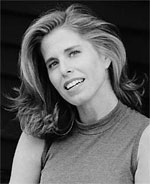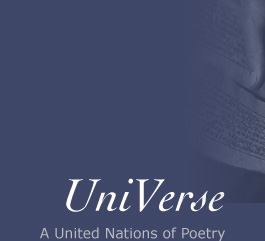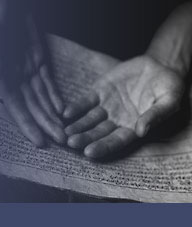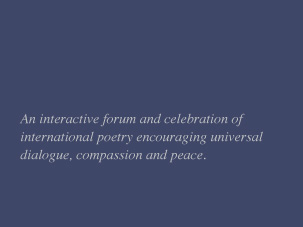| |
 |
 |
 |
 Elise Paschen , an enrolled member of the Osage Nation, is the author of Infidelities (Story Line, 1996), winner of the Nicholas Roerich Poetry Prize, and Houses: Coasts (Oxford: Sycamore Press, 1985). Her poems have been published in The New Yorker, The New Republic, Ploughshares and Shenandoah, among other magazines, and in numerous anthologies, including Reinventing the Enemy’s Language: Contemporary Native Women’s Writings of North America; A Formal Feeling Comes: Poems in Form by Contemporary Women; Poetry 180: A Turning Back to Poetry and The POETRY Anthology, 1912—2002. She is co-editor of Poetry in Motion, Poetry Speaks, Poetry in Motion from Coast to Coast, and Poetry Speaks to Children. Executive Director of the Poetry Society of America from 1988 to 2001, she is the co-founder of “Poetry in Motion,” a nation-wide program which places poetry posters in subways and buses, reaching over 13 million people a day with poetry. A graduate of Harvard University, she holds M.Phil. and D.Phil. degrees in 20th Century British and American Literature from Oxford University. A former Frances Allen Fellow at The Newberry Library, Dr. Paschen teaches in the Writing Program at The School of the Art Institute of Chicago.
The poet Joy Harjo describes Paschen’s work: “These poems are passionate, lyrical episodes of precise and dangerous beauty.” Elise Paschen , an enrolled member of the Osage Nation, is the author of Infidelities (Story Line, 1996), winner of the Nicholas Roerich Poetry Prize, and Houses: Coasts (Oxford: Sycamore Press, 1985). Her poems have been published in The New Yorker, The New Republic, Ploughshares and Shenandoah, among other magazines, and in numerous anthologies, including Reinventing the Enemy’s Language: Contemporary Native Women’s Writings of North America; A Formal Feeling Comes: Poems in Form by Contemporary Women; Poetry 180: A Turning Back to Poetry and The POETRY Anthology, 1912—2002. She is co-editor of Poetry in Motion, Poetry Speaks, Poetry in Motion from Coast to Coast, and Poetry Speaks to Children. Executive Director of the Poetry Society of America from 1988 to 2001, she is the co-founder of “Poetry in Motion,” a nation-wide program which places poetry posters in subways and buses, reaching over 13 million people a day with poetry. A graduate of Harvard University, she holds M.Phil. and D.Phil. degrees in 20th Century British and American Literature from Oxford University. A former Frances Allen Fellow at The Newberry Library, Dr. Paschen teaches in the Writing Program at The School of the Art Institute of Chicago.
The poet Joy Harjo describes Paschen’s work: “These poems are passionate, lyrical episodes of precise and dangerous beauty.”
A link to the Library of Congress webcast featuring Elise Paschen reading at the 2006 National Book Festival, sponsored by the National Endowment for the Arts.
http://www.loc.gov/bookfest/authors/paschen.html
|
 |
 |
English version
Laurel
Before it happened,
something inside had always been demanding
passage, and suddenly would shoot,
like stars, through fingers, toes, and head.
The body seemed inhabited by streams
and I could feel the speed of blood,
its quick-fire circulation.
The first time, I'd been jarred
out of sleep to discover moon
washed over the dirt floor,
and, though startling, it seemed
expected, like some creature staring out
from its reflection in a pool of water.
And next, I understood paralysis:
the way a hare freezes trapped by fear.
So after he'd spotted me in the woods
and started to run, as if chasing down
some animal, just when he was about
to catch up, all I could have wished
came true. That expression on his face,
as if a door was slamming shut
as he stood there,
left holding a handful of leaves.
Published in Infidelities (Story Line, 1996)
Two Standards
— at a Native Writers’ Conference in Norman, Oklahoma
Joan's one eighth. I'm a quarter.
When we walk into Billy's
I want to look like her,
full Osage. "You wouldn't find
an Indian here," she tells me,
"if not for the conference."
And the cigar-chewing driver
shuttling in from the Will
Rogers Airport confides:
"I never seen so many
Indians all in one spot."
The bar's packed like a bar
should be. Joan shows me off,
introducing her friends
to a light-haired, East Coast
educated outsider
whose mother, Ruth Bigheart,
is Oklahoma's pride.
"At that table are some
Osages you should meet."
They know my relatives
in Fairfax, though they come
from Pawhuska, Pawnee.
Angela says the Bighearts,
the keepers of the drum,
will host the Osage dances
next June. "Will you join us?
You'll be given your Osage
name." Even though my grandmother
Bigheart's daughters became
well-known as modern dancers,
she displayed photographs
of my mother and aunt
when they were twelve, eleven
in Osage ceremonial dress,
performing at a powwow.
My mother said her father's
mother taught her those dances.
I say, when asked, I never wanted
to dance, but here, in Billy's
with the jukebox repeating
the Beatles' "Twist and Shout,"
all I want is to dance
and to adopt my mother's
Osage name "Wa-Xthe-thon-ba":
"Two Standards." All I want
is to return to Oklahoma
and answer Angela "Yes,"
though New York City's half
a continent away.
I am my mother's daughter,
"Two Standards," and tonight,
forgetting my given name,
I will take that ancestral one.
Published in Infidelities (Story Line, 1996)
|
|
 |
|





